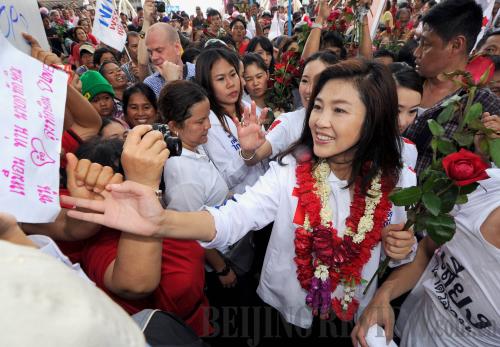|
 |
|
PEOPLE FIRST: Yingluck Shinawatra meets supporters as she campaigns in a suburb of Bangkok on June 30 ahead of Thailand's parliamentary elections (XINHUA/AFP) |
Triple challenges
The power of the grassroots granted Yingluck's Pheu Thai Party victory. But how to effectively harness this power and push Thailand toward stability and development will become the prime minister's principal challenge. While Thaksin was able to bring the grassroots into politics, the past 10 years has seen Thailand's rural majority grow in confidence.
The grassroots majority that brought Yingluck to power is highly conscious of its political power. The "red shirts" engaged in five years of aggressive street politics. Now they have seen their dream of establishing a pro-Thaksin government realized. The new leadership will have to deliver rapid reforms, or it too will potentially face their wrath.
Yingluck and her cabinet therefore will have to explore new ways to engage the majority in political affairs if they are to maintain the support of the grassroots.
The second major challenge confronting the new administration is how to defuse years of tension and anger between the pro-Thaksin "red shirts" and their opponents known as "yellow shirts."
For years, Thailand has seen continuous turmoil and conflict between the two camps. The root of the problem lies in the fundamental conflict of interests between the country's traditional elites, urban middle class and grassroots. Although Yingluck promised to achieve national reconciliation during her campaign, realizing genuine reconciliation will prove difficult. The interests of the groups remain in conflict and renewed conflict is a possibility.
The third challenge facing the government is Yingluck's own political inexperience and the fact that she is perceived as Thaksin's spokesman. How to deal with her brother's influence will, to a large extent, determine the success or failure of her government.
A lack of political experience makes her vulnerable to attacks regarding her ability to govern, while dependence on Thaksin will expose her to criticism of being a puppet. Her closeness to Thaksin will potentially make her term more difficult than those of Samak Sundaravej and Somchai Wongsawat, previous prime ministers allied to Thaksin.
Out of strife
With Yingluck now in control and the "red shirts" satisfied, it seems Thailand has emerged from its years of political strife, but the reality is unlikely to be so straightforward.
Thailand's political dynamics remain unchanged. The dynamics are simple: If there are elections, Thaksin's camp, who lack resources but are strong in numbers, will win. After the elections, the anti-Thaksin camp will fight back using its social resources to regain power. Once this happens, the pro-Thaksin camp will object strongly and even resort to violence. This is how the situation has played out over the past few years.
The root cause again is the conflict between Thailand's different social strata. Whether this deadlock can be resolved will not only affect the future of Thailand's politicians but ultimately affect the stability and prosperity of the whole country. A final resolution of the problem relies on all sections of society behaving responsibly and considering the country's long-term interests.
Yingluck's team, working with the opposition, can encourage a resolution to Thailand's deep-seated problems by working on two major spheres. First, they should work out a plan that will allow all groups to enjoy a more equal share in the benefits of development and economic growth. Second, they should adjust Thailand's political structure by giving farmers a bigger say in the political arena while seeking to prevent and address conflicts between different interest groups based within a legal framework.
Mass political participation and social justice will inevitably prove to be the way forward. Cooperation and sharing responsibilities between different social strata are necessary conditions for stability, peace and development. Only by moving ahead in this direction will Thailand embrace a more stable and prosperous future.
The author is an assistant research fellow with the China Institute of International Studies
Yingluck Shinawatra
Birthday: June 27, 1967
Birthplace: Chiangmai Province in northern Thailand
Education: Two degrees in politics—undergraduate from Chiangmai and master's degree from Kentucky State University in the United States
Previous posts: Senior executive at Advanced Info Service and managing director of SC Asset Co.
(Source: Xinhua News Agency) | 